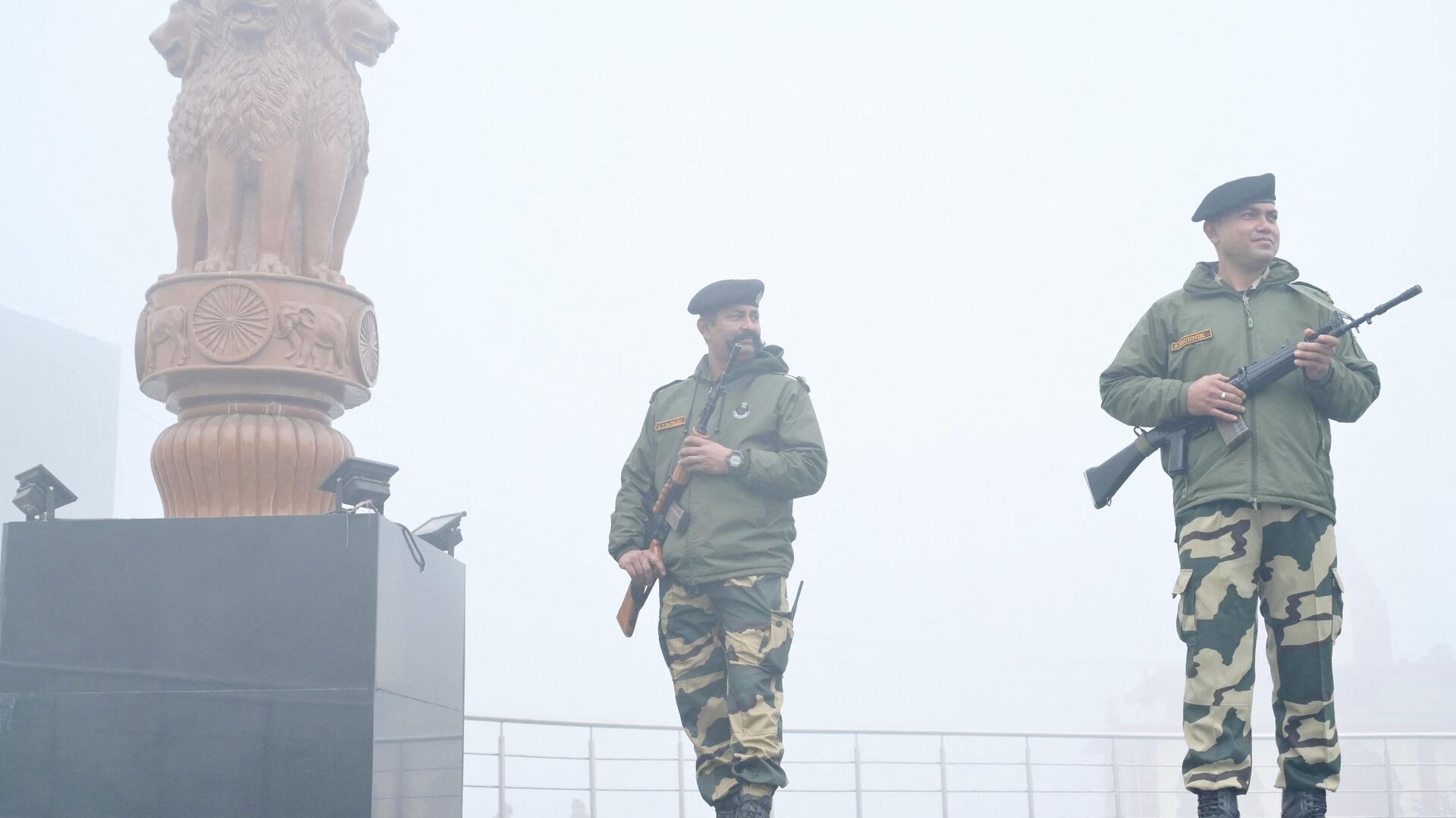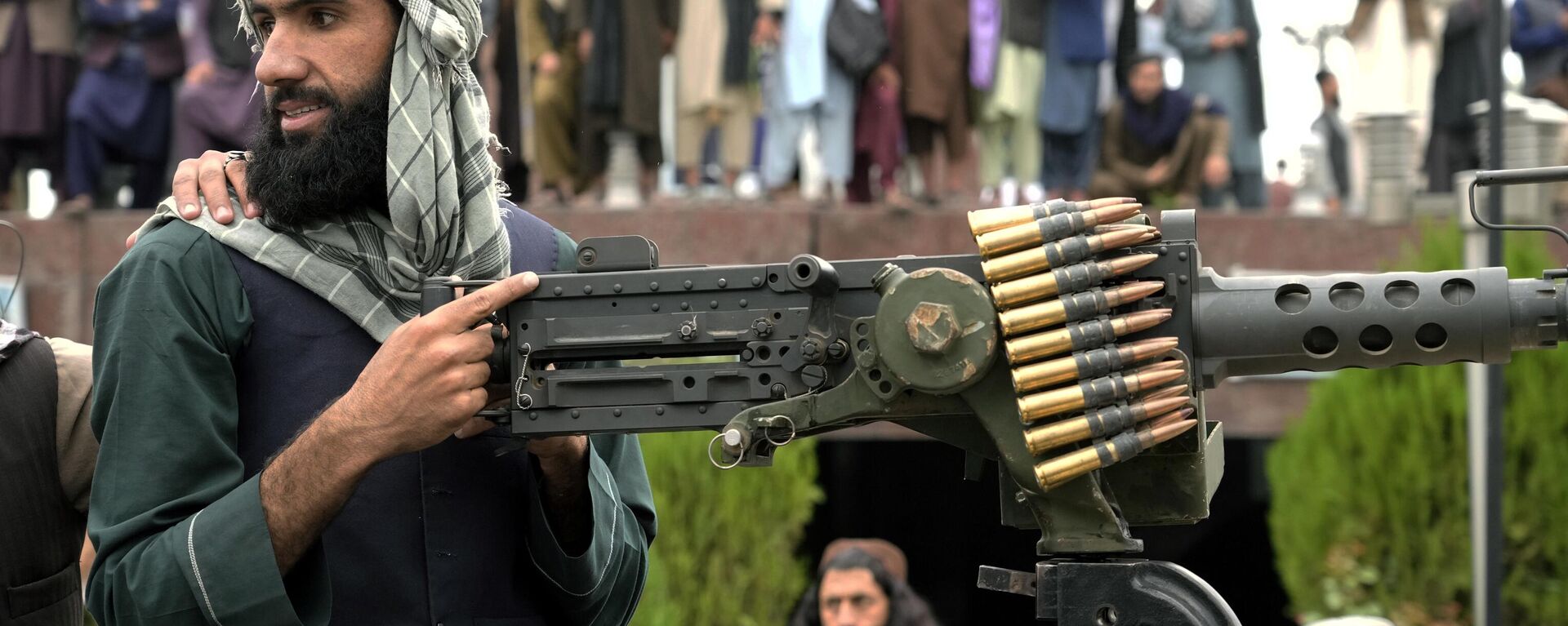https://sputniknews.in/20240415/indo-pak-tensions-over-terrorism-what-could-melt-frozen-relations-7139737.html
Indo-Pak Tensions over Terrorism: What Could Melt Frozen Relations?
Indo-Pak Tensions over Terrorism: What Could Melt Frozen Relations?
Sputnik India
The baggage of their historical rivalry and deep mistrust, especially on the issue of terrorism is preventing India and Pakistan from cooperating on matters related to Afghanistan, a Rawalpindi-based geopolitical pundit has said.
2024-04-15T17:50+0530
2024-04-15T17:50+0530
2024-04-16T17:24+0530
sputnik opinion
india
afghanistan
pakistan
taliban
the united nations (un)
tehreek-e-taliban pakistan (ttp)
kabul
islamabad
new delhi
https://cdn1.img.sputniknews.in/img/07e8/02/02/6421975_0:161:3071:1888_1920x0_80_0_0_4cdbbce06be760a7692b24eb66b438a7.jpg
The baggage of their historical rivalry and deep mistrust, especially on the issue of terrorism is preventing India and Pakistan from cooperating on matters related to Afghanistan, a Lahore-based geopolitical pundit has said.The comments of Shahzad Masood Roomi, the editor of international relations media outlet Global Conflict Watch (GCW) and a geopolitical and military affairs commentator, came in the wake of the creation of a UN contact group on Afghanistan hitting a deadlock due to India-Pakistan tensions.According to Islamabad-based media outlet Express Tribune, Pakistan has protested against India's inclusion in it, fearing that it is "aimed at destabilizing the situation in Afghanistan."India and Pakistan: At Odds on AfghanistanIn this light, Roomi stressed that there is a history of Indo-Pak rivalry in Afghanistan.Lastly, Pakistan does not consider India as a geographical neighbor to Afghanistan, Roomi asserted.He noted that terrorism has emerged as a core issue between India and Pakistan in the Post 9/11 world and both nations have accused each other of fomenting terrorism in each other directly or indirectly.People-Driven Approach Could Mend New Delhi-Islamabad TiesAccording to Roomi, the best line of action can be to adopt a people-driven approach where opportunities must be provided to common citizens to interact, share ideas, and proposals instead of relying on traditional diplomatic channels of communication.He pointed out that more than 1.65 billion people of the region have become hostage of this mistrust and generations have missed the opportunities for mutual cooperation in trade, commerce, culture, art, and business that could have revolutionized the entire socio-economic fabric of the region.Also, the international relations expert observed that the UN along with all major global players, during the last 76 years, has tried to mediate between India and Pakistan on multiple issues including terrorism but nothing has worked.The Taliban Factor in Indo-Pak RelationsIt is worth noting that the Taliban*, Pakistan's once close ally in Afghanistan, seemed to have drifted apart from Afghanistan in recent months, while the hardline Islamic movement's ties appear to be on the upswing with New Delhi keeping in constant touch with authorities in Kabul.Notably, India allowed the Taliban takeover of the Afghan embassy in New Delhi, signaling that the world's largest democratic nation was willing to do business with the current rulers of the Central Asian country.On the other hand, the Taliban has publicly stated that it will not allow anti-India groups to operate from its soil.In contrast, Pakistan has repeatedly accused the Taliban of having links with the banned Tehreek-e-Taliban Pakistan (TTP**), the terrorist group Islamabad believes is behind the spate of recent militant attacks in the South Asian Islamic state.Last month, Pakistan carried out military precision strikes on TTP hideouts in Afghanistan, earning an instant warning of retribution from the Taliban.*under UN sanctions**banned terrorist group
https://sputniknews.in/20240407/the-great-game-revisited-geopolitical-manoeuvring-and-militancy-in-sout-asia-7040276.html
india
afghanistan
pakistan
kabul
islamabad
new delhi
delhi
russia
moscow
Sputnik India
feedback.hindi@sputniknews.com
+74956456601
MIA „Rossiya Segodnya“
2024
Pawan Atri
https://cdn1.img.sputniknews.in/img/07e6/0c/13/139630_147:0:831:684_100x100_80_0_0_8fa2b25903e7787fe6a2698552c167df.png
Pawan Atri
https://cdn1.img.sputniknews.in/img/07e6/0c/13/139630_147:0:831:684_100x100_80_0_0_8fa2b25903e7787fe6a2698552c167df.png
News
en_IN
Sputnik India
feedback.hindi@sputniknews.com
+74956456601
MIA „Rossiya Segodnya“
Sputnik India
feedback.hindi@sputniknews.com
+74956456601
MIA „Rossiya Segodnya“
Pawan Atri
https://cdn1.img.sputniknews.in/img/07e6/0c/13/139630_147:0:831:684_100x100_80_0_0_8fa2b25903e7787fe6a2698552c167df.png
india pakistan un group on afghanistan, afghanistan un group india pakistan, india pakistan differences un group on afghanistan, un group on afghanistan india pakistan differences, un afghanistan group india pakistan, pakistan air force ttp hideouts, pak conducts air strikes inside afghanistan, pakistan air force launches air strikes inside afghanistan, pakistan air force carries out air strikes inside afghanistan, paf air strikes ttp hideouts, tehreek-e-taliban pakistan hideouts paf air strikes, tehreek-e-taliban pakistan sanctuaries paf air strikes, pakistan air force strikes afghanistan, pakistan air force operation afghanistan, pakistan air force action afghanistan, tehreek-e-taliban pakistan paf, pakistan air force, tehreek-e-taliban pakistan, tehreek-e-taliban pakistan news, pakistan air force news, taliban spokesman, zabihullah mujahid, pakistan defense minister, khawaja asif, pakistan defence minister, global conflict watch, shahzad masood roomi,
india pakistan un group on afghanistan, afghanistan un group india pakistan, india pakistan differences un group on afghanistan, un group on afghanistan india pakistan differences, un afghanistan group india pakistan, pakistan air force ttp hideouts, pak conducts air strikes inside afghanistan, pakistan air force launches air strikes inside afghanistan, pakistan air force carries out air strikes inside afghanistan, paf air strikes ttp hideouts, tehreek-e-taliban pakistan hideouts paf air strikes, tehreek-e-taliban pakistan sanctuaries paf air strikes, pakistan air force strikes afghanistan, pakistan air force operation afghanistan, pakistan air force action afghanistan, tehreek-e-taliban pakistan paf, pakistan air force, tehreek-e-taliban pakistan, tehreek-e-taliban pakistan news, pakistan air force news, taliban spokesman, zabihullah mujahid, pakistan defense minister, khawaja asif, pakistan defence minister, global conflict watch, shahzad masood roomi,
Indo-Pak Tensions over Terrorism: What Could Melt Frozen Relations?
17:50 15.04.2024 (Updated: 17:24 16.04.2024) The formation of a UN contact group on Afghanistan was recently stalled due to differences between South Asian rivals India and Pakistan. Sputnik India analyzes if New Delhi and Islamabad could ever come together for the prosperity of the region or if their mistrust is too deep to overcome.
The baggage of their historical rivalry and deep mistrust, especially on the issue of terrorism is preventing India and Pakistan from cooperating on matters related to Afghanistan, a Lahore-based geopolitical pundit has said.
The comments of Shahzad Masood Roomi, the editor of international relations media outlet Global Conflict Watch (GCW) and a geopolitical and military affairs commentator, came in the wake of the creation of a UN contact group on Afghanistan hitting a deadlock due to India-Pakistan tensions.
According to Islamabad-based media outlet Express Tribune, Pakistan
has protested against India's inclusion in it, fearing that it is
"aimed at destabilizing the situation in Afghanistan."India and Pakistan: At Odds on Afghanistan
In this light, Roomi stressed that there is a history of Indo-Pak rivalry in Afghanistan.
"During the 1990s when Pakistan was backing the Afghan Taliban, India was supporting the Northern Alliance led by Ahmad Shah Masood. Now as multiple groups are once again fighting each other for control in Afghanistan like ISKP, National Resistance Front (NRF), and various splinters of TTP, Unknown VNSAs (violent Non-State Actors) acting as spoilers, etc. all this baggage of history has fueled the negative perception in Islamabad about India's growing role in Afghanistan," he told Sputnik India on Monday.
Lastly, Pakistan does not consider India as a geographical neighbor to Afghanistan, Roomi asserted.
He noted that terrorism has emerged as a core issue between India and Pakistan in the Post 9/11 world and both nations have accused each other of fomenting terrorism in each other
directly or indirectly.
"Notwithstanding traditional longstanding issues like Kashmir, the current level of mistrust was never there in bilateral relations and terrorism is the primary cause of this mistrust. This is exactly why the issue of terrorism must be addressed through mutual cooperation," the strategic affairs analyst added.
People-Driven Approach Could Mend New Delhi-Islamabad Ties
According to Roomi, the best line of action can be to adopt a people-driven approach where opportunities must be provided to common citizens to interact, share ideas, and proposals instead of relying on traditional diplomatic channels of communication.
He pointed out that more than 1.65 billion people of the region have become hostage of this mistrust and generations have missed the opportunities for mutual cooperation in trade, commerce, culture, art, and business that could
have revolutionized the entire socio-economic fabric of the region.
Also, the international relations expert observed that the UN along with all major global players, during the last 76 years, has tried to mediate between India and Pakistan on multiple issues including terrorism but nothing has worked.
"So there is no reason to believe that the Shanghai Cooperation Organisation (SCO) or Russia will make any difference as long as a desire for engagement is not created from both sides. As long as the bilateral mistrust on issues like terrorism is there no regional or global forum will be able to bring both states closer," Roomi opined.
The Taliban Factor in Indo-Pak Relations
It is worth noting that the Taliban*, Pakistan's once close ally in Afghanistan, seemed to have drifted apart from Afghanistan in recent months, while the hardline Islamic movement's ties appear to be on the upswing with New Delhi keeping in constant touch with authorities in Kabul.
Notably, India allowed the Taliban takeover of the Afghan embassy in New Delhi,
signaling that the world's largest democratic nation was willing to do business with the current rulers of the Central Asian country.
On the other hand, the Taliban has publicly stated that it will not allow anti-India groups to operate from its soil.
"We are an independent country and we want to have positive relations with India and other countries," Suhail Shaheen, who heads the Taliban's Political Office in Doha said in a previous interview.
In contrast, Pakistan has repeatedly accused the Taliban of having links with the banned Tehreek-e-Taliban Pakistan (TTP**), the terrorist group Islamabad believes is behind the spate of recent militant attacks in the South Asian Islamic state.
Last month, Pakistan carried out
military precision strikes on TTP hideouts in Afghanistan, earning an instant warning of retribution from the Taliban.



